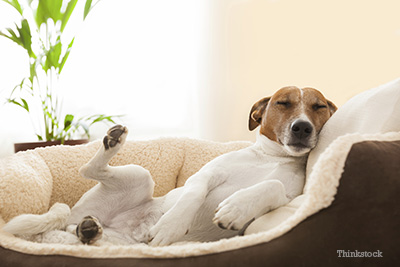
Have you ever had the experience of entertaining guests or perhaps just relaxing in front of the television when suddenly you become aware of a very unpleasant odor perhaps preceded by a “toot?” All animals “pass gas,” including humans, and it is common to blame the dog for these episodes of nearly toxic odors. Well, indeed the dog is sometimes to blame. The question is, “Is this just an inconvenience or is there some sort of GI disease to blame?”
In some cases the associated odor can be so unpleasant as to interfere with the bond between pet and owner. A recent article in DVM360 Magazine, by Ed Kane, PhD states, “Persistence in finding the cause and crafting a solution can help keep owners content and your canine patients in their homes.” The term for the unpleasant condition that is commonly accepted in proper conversations is "Flatus" or "Flatulence" referring to excess gas from the GI tract being expelled through the anus.
Flatus, a byproduct of bacterial fermentation may be associated with dietary causes among other things. Claudia Kirk, DVM, DACVN, DACVIM, a professor at the University of Tennessee College of Veterinary Medicine, believes some eating habits can promote aerophagia or swallowing of air which might lead to flatulence. Many veterinarians like Jillian Haines, DVM, MS, assistant professor of small animal internal medicine at Washington State University College of Veterinary Medicine, disagree with that theory, sighting little evidence, and believe that aerophagia does not appear to affect whether or not an animal would fart.
Is diet a cause of dog farts?
Indigestible carbohydrates as well as high meat products can result in foul smelling gases, reports Kane. His article also says flatulence can be associated with beans, soybeans, eating feces and eating table scraps. Joe Wakshlag, DVM, PhD, DACVIM, DAVCSMR, associate professor of clinical nutrition at Cornell University College of Veterinary Medicine, recommends that owners curb table foods and treats to 10 to 20 percent of total energy intake1.
Can dog farts be an indication of gastrointestinal disease?
Incomplete digestion and absorption (malabsorption) can result in excess gas and is associated with a number of conditions including ulcerative colitis and inflammatory bowel disease (IBD)2,3. Dr. Haines says that, “With IBD, the GI tract is infiltrated with inflammatory cells such as lymphocytes and plasmacytes. The inflammation leads to alterations in intestinal contents and disruptions of normal microflora, potentially causing bacterial overgrowth, which affects the intestine’s ability to absorb nutrients normally.”
How is the cause of dog farts diagnosed?
Diagnosing the cause of excessive farts can be very complicated and may include GI imaging including ultrasound, blood tests looking for exocrine pancreatic insufficiency (EPI), IBD or pancreatitis. Additional tests may include cobalamin (vitamin B-12) and folate concentrations. Endoscopic or surgical biopsies are often needed to further evaluate for IBD.
If organic diseases are not found the treatment involves symptomatic medical management.
Dietary management may be of help. One change that may help is a reduction in dietary fiber. Some intestinal therapeutic diets, including those used for dietary allergies, may be of help too. In the end anything that causes fermentation (e.g., soluble fibers) will cause a lot of gaseous emissions to occur. What works in one case may not work in another.
Are probiotics of value?
According to Kane, "A recent paper presented at a European Society of Veterinary and Comparative Nutrition conference noted a statistically significant reduction in flatulence associated with a probiotic treatment."
Clinical and environmental management of dog farts
Slow the eating process and reduce stress associated with feeding. According to Dr. Kirk, “Competitive eating is a potential problem, so ensure there are no other dogs around to incite the dog to eat more quickly and gulp more air.” Feeding smaller, more frequent meals can also decrease the amount of air that dogs swallow, and so can mixing dry and canned food, Haines says1. Regular exercise can also help a dog to empty the bowels4.
Dog farts are no laughing matter
While flatus is unpleasant as well as embarrassing, regardless of the source, it can also be an indication of more serious gastrointestinal problems. It is important to consider that if it is severe enough to comment on it, is important enough to discuss with your veterinarian.
Don’t minimize the issue. Ask your veterinarian for suggestions.
If you have any questions or concerns, you should always visit or call your veterinarian -- they are your best resource to ensure the health and well-being of your pets.
Resources:
- King, Ed. "Flatulence in Dogs: Annoyance or Sign of GI Illness?" Dvm360. N.p., 1 Jan. 2015. Web. 5 Feb. 2015.
- Manchester, AC, S. Hill, and B. Sabatino. "Association between Granulomatous Colitis in French Bulldogs and Invasive Escherichia Coli and Response to Fluoroquinolone Antimicrobials." Journal of Veterinary Internal Medicine 27 (2013): 56-61.
- Dossin, O., and R. Lavoue. "Protein-losing Enteropathies." Veterinary Clinics: Small Animal Practice 41 (2011): 399-418.
- Jones, BR, K. Turner, and B. Rogatski. "Flatulence in Pet Dogs." New Zealand Veterinary Journal 46 (1998): 191.
